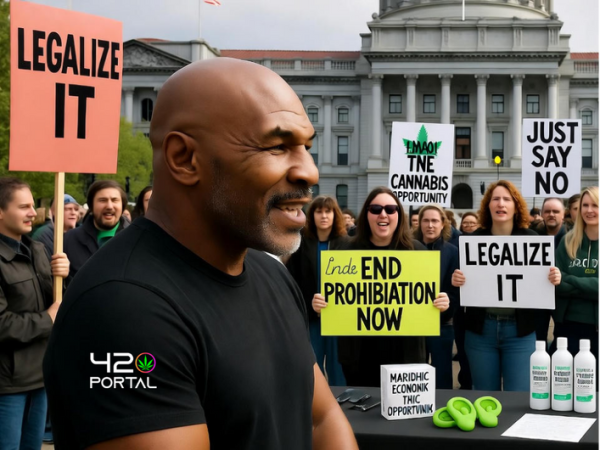Mike Tyson Steps into Ring of Pennsylvania's Marijuana Debate

10/31/2025
Boxing legend Mike Tyson has emerged as a vocal champion for recreational marijuana legalization in Pennsylvania. The former heavyweight titleholder, whose ring career was marked by raw power and controversy, now channels that intensity into reforming the state's cannabis policies. Tyson's personal journey with marijuana—using it as a lifeline during his battle against harder substances—fuels his passion, transforming him from fighter to front man for a greener future.
At the helm of a holding company that backs multiple celebrity-endorsed weed ventures, Tyson recently unveiled his own flagship brand, Tyson 2.0. The line boasts innovative edibles like THC-infused gummies molded in the likeness of a notorious boxing rival's ear, a cheeky nod to his infamous 1997 bite. But beyond the buzzworthy marketing, Tyson's mission is serious: bridging the gap between Pennsylvania's restrictive medical-only framework and the booming recreational markets in neighboring states.
Tyson made waves in Harrisburg, pressing lawmakers on the untapped potential of full legalization. He spotlighted the economic windfall slipping away—millions in lost tax dollars and thousands of jobs that could sprout in cultivation, retail, and ancillary sectors. He highlighted how opportunity fades as people resort to unregulated products that pose health risks, committing to advocate relentlessly for a system that ensures legality, registration, and safety for all. His pitch resonates amid growing evidence that regulated cannabis curbs black-market dangers and bolsters public health through quality controls.
The political landscape offers glimmers of hope, tempered by partisan friction. Governor Josh Shapiro has woven recreational sales into his fiscal blueprint, eyeing over half a billion dollars in licensing revenue to fund schools and infrastructure. Yet the Republican-dominated Senate drags its feet, wary of inflated projections and the strain on law enforcement from potential impaired driving spikes. Senate President Pro Tempore Kim Ward, after a sit-down with Tyson, struck a measured tone: while acknowledging flaws in the existing medical program—like inconsistent access—she stressed the need for caucus consensus before any green light.
On the flip side, the Democratic-led House has advanced a measure to roll out sales via state-operated outlets under the Pennsylvania Liquor Control Board, aiming for tight oversight akin to booze distribution. This irks industry insiders, who push for a free-market model with private dispensaries to spur innovation and competition.
Reference
At the helm of a holding company that backs multiple celebrity-endorsed weed ventures, Tyson recently unveiled his own flagship brand, Tyson 2.0. The line boasts innovative edibles like THC-infused gummies molded in the likeness of a notorious boxing rival's ear, a cheeky nod to his infamous 1997 bite. But beyond the buzzworthy marketing, Tyson's mission is serious: bridging the gap between Pennsylvania's restrictive medical-only framework and the booming recreational markets in neighboring states.
Tyson made waves in Harrisburg, pressing lawmakers on the untapped potential of full legalization. He spotlighted the economic windfall slipping away—millions in lost tax dollars and thousands of jobs that could sprout in cultivation, retail, and ancillary sectors. He highlighted how opportunity fades as people resort to unregulated products that pose health risks, committing to advocate relentlessly for a system that ensures legality, registration, and safety for all. His pitch resonates amid growing evidence that regulated cannabis curbs black-market dangers and bolsters public health through quality controls.
The political landscape offers glimmers of hope, tempered by partisan friction. Governor Josh Shapiro has woven recreational sales into his fiscal blueprint, eyeing over half a billion dollars in licensing revenue to fund schools and infrastructure. Yet the Republican-dominated Senate drags its feet, wary of inflated projections and the strain on law enforcement from potential impaired driving spikes. Senate President Pro Tempore Kim Ward, after a sit-down with Tyson, struck a measured tone: while acknowledging flaws in the existing medical program—like inconsistent access—she stressed the need for caucus consensus before any green light.
On the flip side, the Democratic-led House has advanced a measure to roll out sales via state-operated outlets under the Pennsylvania Liquor Control Board, aiming for tight oversight akin to booze distribution. This irks industry insiders, who push for a free-market model with private dispensaries to spur innovation and competition.
Reference







